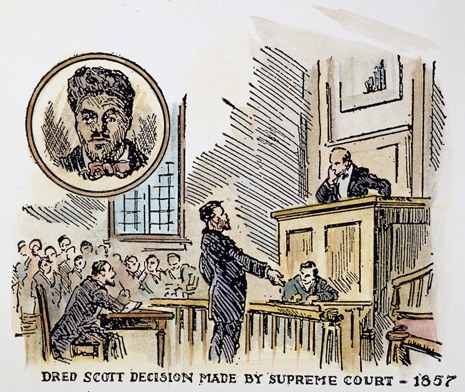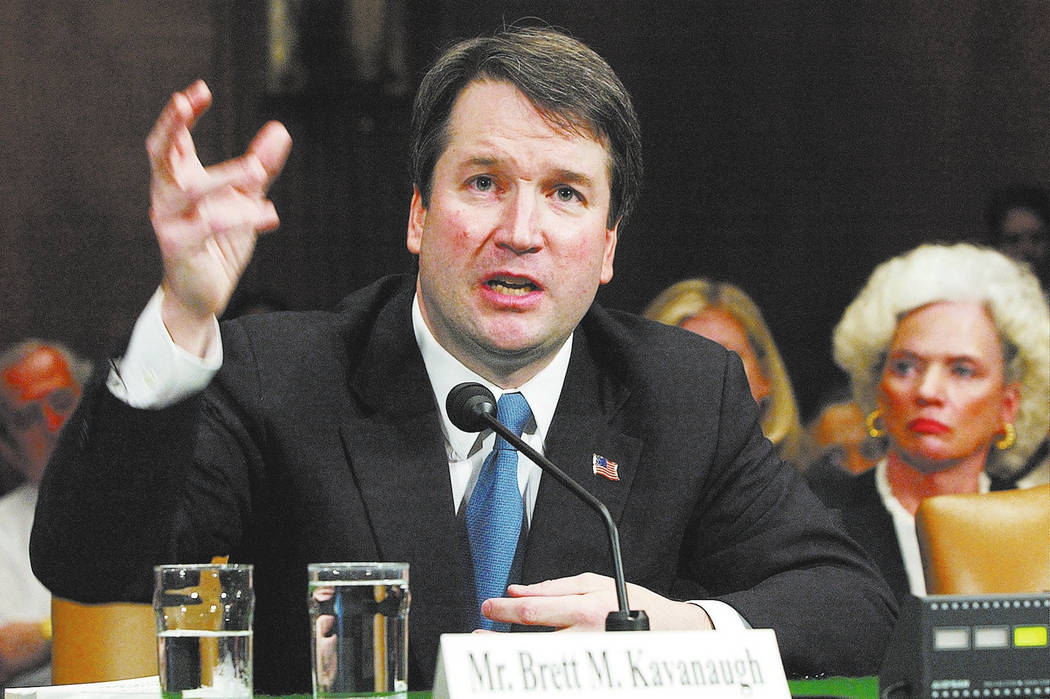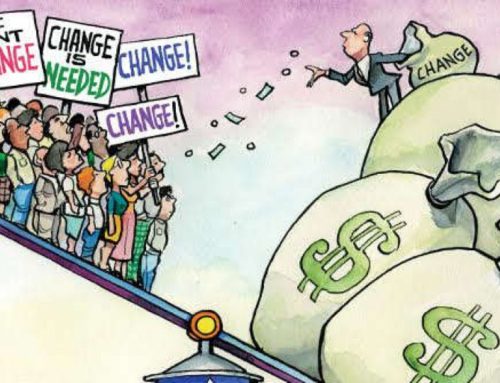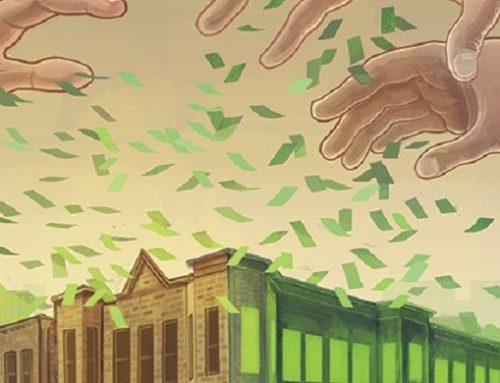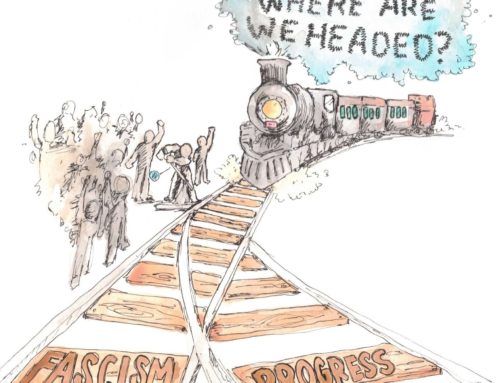This piece was originally written in August 2018 in response to the nomination of Brett Kavanaugh to the Supreme Court. Now, in May 2019, Alabama, Arkansas, Georgia, Kentucky, Mississippi, Missouri, Ohio and Utah have passed new anti-abortion bills in the interest of creating court cases that will lead to Roe V. Wade being challenged in the Supreme Court. Although this possibility was at the very center of arguments against appointing Kavanaugh a year ago, responses today are varied and unorganized. The people’s attempts to progress the conversation towards a unified, consolidated position against the steady stripping of our bourgeois democratic rights have been brought right back to the same conversations circling around the divisions that bar us from class unity while benefiting capitalists. Calls for men to understand the abortion bills from a female perspective, white people to understand them from the perspective of POC, cis people to understand them from the perspective of non-binary folks – these are important and valued lenses for addressing domination, but only a class-centered perspective can incorporate all of these shades of humanity while forming a unified block against the true enemy of our interests – the capitalist class. We are not taking away each other’s rights, the bourgeoisie and their dictatorship reward and retract them as they see fit in order to dominate the masses. What we’re witnessing is the consolidation of Fascism – the bourgeoisie are taking us back in time in order to force the survival of dying industries and volatile methods of accumulation while resolving a contradiction within their own class. Although sections of the capitalist class may oppose fascism, the side of “resistance” does not have an alternative to the economic crisis leading us toward fascist consolidation. Every faction of the masses can be collateral damage to resolving this internal conflict
The solution is not something that can occur on an emergency-basis. Political unity must be cultivated through struggling amongst each other in our communities, our schools, and our workplaces over time. We will continue to see the consolidation of fascism, the loss of bourgeois democratic rights, and the weakening of the mechanisms put in place to give us the illusion of representation. Now is the time to break down the capitalist ideologies that keep us isolated from each other and gain an understanding of the true priorities at play here.
At its best, the Supreme Court is meant to make the Constitution adaptable to the changing needs of society. In reality, it is the top tier of a capitalist, bureaucratic ladder that turns human need into semantic arguments for the sake of parceling out freedoms just enough to pacify the masses. It speaks clearly to the interests served by this system when an institution that asserted African Americans are not people (Dred Scott v. Sandford 1857), permitted compulsory sterilization of the intellectually disabled (Buck v Bell 1927), and condoned Japanese internment (Korematsu v. United States 1944) still has relevance and power today.
The Supreme Court has been using that power to further corporate personhood and weaken the power of the collective. With President Nixon’s nomination of Lewis Powell Jr. onto the Supreme Court in 1972 came the presence of the U.S. Chamber of Commerce’s special interests for decades to come. In a memo to the Chamber shortly before his appointment, Powell wrote of the U.S. economic system coming under attack by everyone from Communists to college students. He urged that businesses take a more active role in defending themselves from this siege, especially through direct involvement in politics. Since then, the Chamber has had increasing influence over the cases brought before the supreme court and their decisions. Their input can be found in the majority of cases concerning the proliferation of corporate rights.
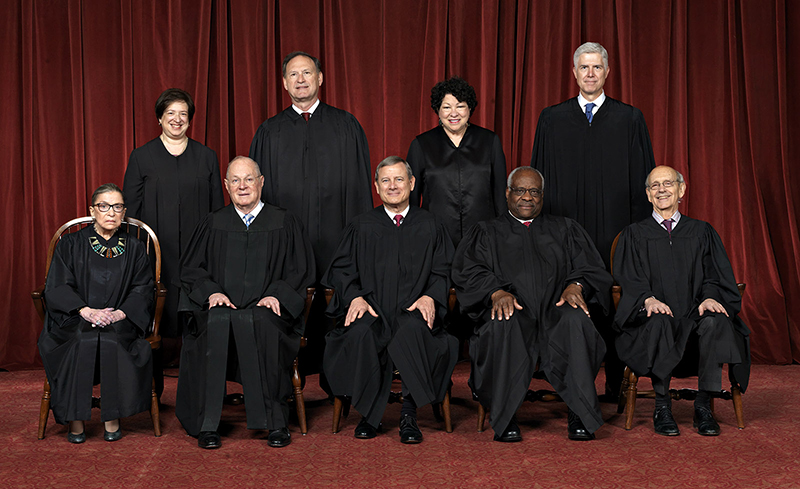
Front row, left to right: Associate Justice Ruth Bader Ginsburg, Associate Justice Anthony M. Kennedy, Chief Justice John G. Roberts, Jr., Associate Justice Clarence Thomas, Associate Justice Stephen G. Breyer. Back row: Associate Justice Elena Kagan, Associate Justice Samuel A. Alito, Jr., Associate Justice Sonia Sotomayor, Associate Justice Neil M. Gorsuch.
Credit: Franz Jantzen, Collection of the Supreme Court of the United States
Cut to modern day. The Chamber has won 69% of the cases in which they have been involved in since John Roberts became Chief Justice in 2005. In Citizens United v. Federal Election Commission, the court found that political spending is a form of protected speech under the First Amendment and the government may not keep corporations from spending money to support or denounce individual candidates in elections. Horne v the Department of Agriculture, reported as “small-time farmer” Marvin D. Horne taking on the government, actually concerns “Raisin Valley Farms,” the largest raisin producer in the California valley where most of the world’s raisins come from. The supreme court’s defense of their monetary compensation on the basis of the fifth amendment right to compensation from government takings sets precedent that will stand to benefit large corporations and drag us deeper into a reality where a business can have all of the same rights as a person, but with enough money and power to structure the entire country to their benefit. In both of these cases, the Chamber of Commerce filed multiple briefs in order to influence the opinion of the court. Meanwhile, average Americans who do not spark the interest of massive lobbying groups are toiling away in the lower courts, being issued arrest warrants by judges in collusion with collections agencies, and being jailed in a return to debtor’s prisons thought to be a thing of the past.
What naturally follows the bestowing of human rights to corporations is the stripping of those rights from the rest of the population. In AT&T Mobility LLC v. Concepcion in 2011, corporations gained the power to force consumers to individually file lawsuits against a company, allowing them to protect themselves from class action lawsuits by consumers (Oh, is that a Chamber of Commerce amicus brief I see?). This legal protection was expanded this year to employee class action lawsuits in Epic Systems v. Lewis (wow Chamber we really can’t keep meeting like this). One month later in Janus v. American Federation of State, County, and Municipal Employees, the court ruled that government workers who choose not to join unions may not be required to help pay for collective bargaining, effectively crippling public sector unions. Corporations have successfully cultivated legal ground for exploitation of their workers and relieved themselves of the need to be accountable to their customers.
That is where we have been and where we are now, but where are we headed? President Donald Trump, a blunt force for the fascist fraction of the capitalist class, has nominated his second supreme court justice. In Brett Kavanaugh, big business will find yet another bedfellow in the high courts (here is his endorsement from the Chamber of Commerce). He has consistently shown that his loyalties lie with the wealthy and not working Americans, a position that seems painfully redundant for today’s supreme court. Who stands to benefit from the appointment of a judge that the NRA has vowed to spend $1 million to get into office? The Judge has stood staunchly against unions in the majority of cases that have come before him. In Midwest Division-MMC, LLC v. NLRB, when nurses were denied union representation in peer-review meetings, Kavanaugh sided with the hospital and their need for confidentiality over the worker’s rights. In NLRB v. CNN, Kavanaugh sided with CNN in their removal of unionized workers and denied that they took part in unfair labor practices. He has expressed opinions that undocumented workers are not eligible to unionize and, furthermore, negate the power of the unions they participate in. His stance on net neutrality blatantly favors the interests of large telecommunications agencies. In 2016 he went after the Consumer Protections Bureau, stating that their structure is unconstitutional and the President should have the power to fire the director. People are understandably concerned about his standing on social issues, but more troubling is his love affair with big business and direct opposition to workers. Kavanaugh’s appointment not only threatens decisions like Roe v. Wade, but also intensifies the onslaught of Fascist consolidation.
We’ve been fed the belief that our system of government has built-in checks and balances against the absolute corruption of absolute power. Bourgeois democracy and its state apparatus do not serve our interests. Instead, state institutions and their representatives exist to divide, disorganize, and pacify us. Courts make rulings that throw piecemeal concessions toward our bourgeois democratic rights while simultaneously eroding our power to band together and fight back against the interests of the capitalist class. Laws and legislation are made deliberately confusing through legalese and opaque proceedings in order to keep us from exercising our true power – the power that lies in our direct, organized action. Justice comes from people organized as a social force, fighting for their interests.
Currently, the retraction of bourgeois democratic rights has the country crying Fascism, but its root is in the social, political, and economic arrangement – capitalism – that has reached a structural crisis, thanks to banking and finance. Violence based on toxic ideologies are meant to rally a base of support for policies that will only make the rich richer. In order to truly resist Fascism, we must recognize that capitalism is still the problem. We must be vigilant against the capitalist alternatives. We must recognize that the state apparatus and institutions like the Supreme Court fundamentally exist to protect the wealth of the few while screwing everybody else over. We must be aware of these interests on our streets, in our workplaces, and in our communities. We must resist them globally. We must resist them nationally. We must resist them locally.
STAND UP. FIGHT BACK. ORGANIZE.
onestruggle.southflorida@gmail.com
onestruggle.fiu@gmail.com
FB – @OneStruggle
IG – @OneStruggle.FIU
Twitter – @OneStruggleSF

